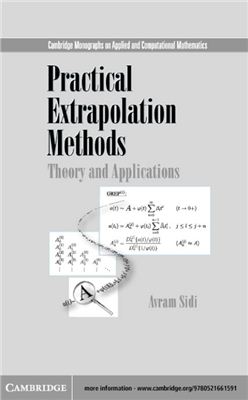Cambridge University Press, Cambridge monographs on applied and
computational mathematics -- 10, 2003, 519 p.
Preface; Introduction; Part I. The Richardson Extrapolation Process and Its Generalizations:
The richardson extrapolation process;
Additional topics in Richardson extrapolation;
First generalization of the Richardson extrapolation process;
GREP: further generalization of the Richardson extrapolation process;
The d-transformation: a GREP for infinite-range integrals;
The d-transformation: a GREP for infinite series and sequences;
Recursive algorithms for GREP;
Analytic study of GREP (1): slowly varying A(y) ? F(1);
Analytic study of GREP(1): quickly varying A(y) ? F(1); 10: Efficient use of GREP(1): applications to the D(1)-, d(1)- and d(m)-transformations;
Reduction of the d-transformation for oscillatory infinite-range integrals: the D-, D-, W-, and mW-transformations;
Acceleration of convergence of power series by the d-transformation: rational d-approximants;
Acceleration of convergence of Fourier and generalized Fourier series by the d-transformation: the complex series approach with APS;
Special topics in Richardson extrapolation; Part II. Sequence Transformations:
The Euler transformation, Aitken ?2-process, and Lubkin W-transformation;
The Shanks transformation;
The Pad? table;
Generalizations of Pad? approximants;
The Levin L- and S-transformations;
The Wynn ?- and Brezinski ?-algorithms;
The g-transformation and its generalizations;
The transformations of Overholt and Wimp;
Confluent transformations;
Formal theory of sequence transformations; Part III. Further Applications:
Further applications of extrapolation methods and sequence transformations; Part IV. Appendices: A. review of basic asymptotics; B. The Laplace transform and Watson's lemma; C. The gamma function; D. Beoulli numbers and polynomials and the Euler-Maclaurin formula; E. The Riemann zeta function; F. Some highlights of polynomial approximation theory; G. A compendium of sequence transformations; H. Efficient application of sequence transformations: Summary; I. FORTRAN 77 program for the d(m)-transformation
Preface; Introduction; Part I. The Richardson Extrapolation Process and Its Generalizations:
The richardson extrapolation process;
Additional topics in Richardson extrapolation;
First generalization of the Richardson extrapolation process;
GREP: further generalization of the Richardson extrapolation process;
The d-transformation: a GREP for infinite-range integrals;
The d-transformation: a GREP for infinite series and sequences;
Recursive algorithms for GREP;
Analytic study of GREP (1): slowly varying A(y) ? F(1);
Analytic study of GREP(1): quickly varying A(y) ? F(1); 10: Efficient use of GREP(1): applications to the D(1)-, d(1)- and d(m)-transformations;
Reduction of the d-transformation for oscillatory infinite-range integrals: the D-, D-, W-, and mW-transformations;
Acceleration of convergence of power series by the d-transformation: rational d-approximants;
Acceleration of convergence of Fourier and generalized Fourier series by the d-transformation: the complex series approach with APS;
Special topics in Richardson extrapolation; Part II. Sequence Transformations:
The Euler transformation, Aitken ?2-process, and Lubkin W-transformation;
The Shanks transformation;
The Pad? table;
Generalizations of Pad? approximants;
The Levin L- and S-transformations;
The Wynn ?- and Brezinski ?-algorithms;
The g-transformation and its generalizations;
The transformations of Overholt and Wimp;
Confluent transformations;
Formal theory of sequence transformations; Part III. Further Applications:
Further applications of extrapolation methods and sequence transformations; Part IV. Appendices: A. review of basic asymptotics; B. The Laplace transform and Watson's lemma; C. The gamma function; D. Beoulli numbers and polynomials and the Euler-Maclaurin formula; E. The Riemann zeta function; F. Some highlights of polynomial approximation theory; G. A compendium of sequence transformations; H. Efficient application of sequence transformations: Summary; I. FORTRAN 77 program for the d(m)-transformation

